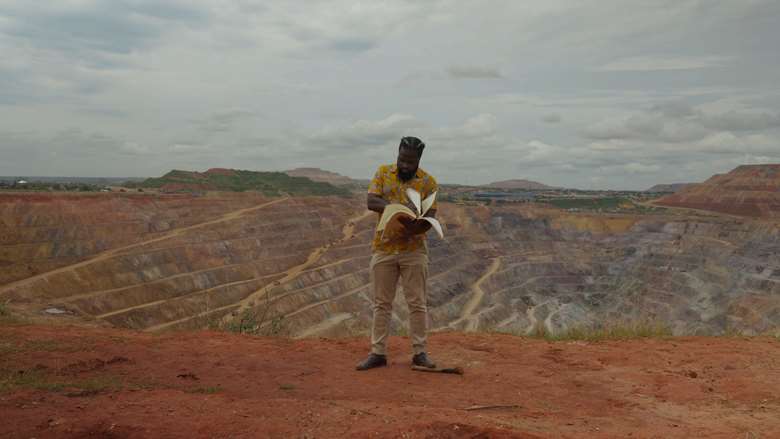'We are all broken': For Hèctor Parra, justice is complex
Coriander Stuttard
Thursday, November 30, 2023
The Catalan composer talks to Coriander Stuttard about how his new opera Justice, which tells the story of the fallout from an acid spill in the Democratic Republic of Congo, seeks to portray the deep and complex impact the tragedy had on the local community

At the point of speaking to composer Hèctor Parra about his opera Justice, he modestly says it is still a ‘work in progress’. Set to be performed at Geneva’s Grand Théâtre in January, rehearsals haven’t yet begun and he is finishing its orchestration, but Parras also believes his journey with this opera will not feel complete until he has visited the Democratic Republic of Congo, where it is set. Speaking in-depth with Parra, it becomes clear that his process of composing the opera – based on a script by Swiss theatre director Milo Rau and libretto by Congolese writer Fiston Mwanza Mujila – has involved him living with many various art forms connected with the country. ‘They have been with me day and night,’ he says, referring not only to the stories of the real-life characters of the opera, but to the statues and art relating to fertility, women and death which have sat beside him in his studio as he writes. ‘I have to try and fuse with them to try and transmit them through the vocal and orchestral writing – they are compelling me.’
 ‘It is not just a case of good and bad, there were different motivations in the different characters, and they are not rigid characters, they become changed.’
‘It is not just a case of good and bad, there were different motivations in the different characters, and they are not rigid characters, they become changed.’
The story at the heart of the libretto of the opera is that of a tragic accident: a moment in 2019 when a tanker laden with sulphuric acid destined for the Mutanda copper mine collided with a school bus and a market. The collision killed 21 people and exposed a deeper tragedy; local people caught up in the western management of extraction and profit of raw minerals from a country ravaged by genocide over the past decades. The opera focuses on the point of the accident but projects a fantasy five years later, bringing it to the point of performance in 2024 and the inauguration of a school on the site of the accident. As the opera unfolds, ghosts emerge, blood rises to the surface and the voices of the victims and their families, as well as figures within Glencore, the company which managed the mine, are given a stage. Parra, like Rau and Mujila has sat with hundreds of testimonies which are brought to light during the opera through sections of Swahili as well as French text, and occasional video projections onto the stage. ‘We have to feel the emotions of all those involved,’ Parra explains. ‘It is not just a case of good and bad, it’s not just that the people in the company were bad, there were different motivations in the different characters, and they are not rigid characters, they become changed.’
"We have to know and respect difference, we cannot mix brutally because then it becomes about power"
Parra was also aware that he needs to reach a wide audience with his writing. ‘I tried to develop lyric and real voices,’ he says. ‘I have to allow the voice to fly and touch opera goers.’ He draws an example of the voice of a boy which comes through as a ‘the memory of an angel’ in melody which emerged from an amalgamation of the music from the different cultures represented in the DRC and which, in the opera, breaks out of a rhythmic, one-pitch orchestral episode. The opera also features the Congolese guitar player, Kojack Kossakamvwe whose solo guitar emerges from a brutal orchestral passage.
 Justice premieres at the Grand Théâtre de Genève on 22 January 2024, and will run until 28 January
Justice premieres at the Grand Théâtre de Genève on 22 January 2024, and will run until 28 January
Parra immersed himself in Congolese music, both traditional and pop, to influence his writing but did not want to specify any one style of the Katanga region of the southern DRC where the opera is set. He also felt it important to recognise the distance between the DRC and his identity as a Catalan composer living in France. Feeling it too difficult to use African instruments, he nonetheless uses lots of keyboards such as marimbas in the percussion and tries to evoke breathy, wide sounds in the woodwind. ‘It is Katanga and Kasai emotions’ he explains, ‘but we are in opera, and they must transfigure opera language.’
"I tried to develop lyric and real voices, I have to allow the voice to fly and touch opera goers"
The cast, which includes Jamaican-British bass-baritone Sir Willard White and soprano Axelle Fanyo, is culturally diverse: only two characters are taken by singers who do not reflect African heritage in their ancestry. Diversity in the opera is about more than the cast. Parra cites his Catalan identity when he appreciates the complexities of cultures which are not represented by the main state. There are more than 400 languages in the DRC but there is always a need for cohesion, otherwise there is what Parra refers to as ‘a malaise’. ‘We are all broken,’ Parra says. ‘To do a good mix, we have to know and respect difference, we cannot mix brutally because then it becomes about power – the most powerful people want everyone to become like them.’ It feels like Parra has been absorbing the conflicts, post-colonial legacies and the rich culture of the DRC to compose Justice, an opera which he hopes will incorporate ‘the complexity of the situation but will find harmony and beauty, not just pain and death.’



